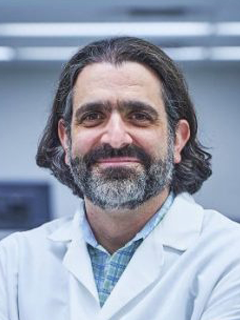HOW CAN WE HELP YOU? Call 1-800-TRY-CHOP
Center for Precision Medicine for High-risk Pediatric Cancer
Cancer remains the leading cause of disease-related death in children with approximately 3,000 children each year experiencing relapse or refractory disease. Precision medicine has emerged as a potentially transformative strategy for patients with high-risk cancers. As opposed to assigning treatment solely based on histology, tumors are profiled to identify unique molecular alterations and patients are then offered therapy that specifically targets these vulnerabilities. Often precision therapies can be effective across tumor types, redefining treatment based on a molecular target rather than histology.
The Center for Precision Medicine for High-Risk Pediatric Cancer will build upon ongoing precision medicine efforts across many departments at CHOP, bringing together specialists from across divisions and departments, such as Pediatric Oncology, the Division of Genomic Diagnostics, and the Departments of Surgery, Radiology, Pathology and Laboratory Medicine, and Radiation Oncology. We will translate novel tumor profiling assays from the laboratory to the clinic. This includes partnership with the Center of Data-Driven Discovery in Biomedicine to build the largest dataset in pediatric cancer that combines information on the patient, tumor, multi-omics, epigenetics and outcome. We are working to utilize this dataset to help define treatment options for individual patients and to allow researchers to better understand these tumors to develop new treatment options for children with high-risk cancers. We will significantly expand our ability to conduct clinical trials, including novel studies based on CHOP laboratory discoveries, to rapidly translate these treatment options to patients. These novel diagnostic, informatic, and treatment options will allow us to refine the treatment plan for each patient and learn from each patient to improve treatment for future patients.
Research Highlights
Pediatric Thyroid Cancer
Clinical trials integrating targeted therapy into standard of care by building on studies demonstrating TRK inhibitors to be effective for cancers with a specific genetic alteration. Dr. Laetsch now leads several clinical trials evaluating whether these drugs can replace chemotherapy for children whose tumors harbor one of these alterations as well as a U.S. Department of Defense study evaluating whether these drugs can enhance the efficacy of standard therapy for patients with thyroid cancer.
Precision Therapies for Ewing Sarcoma
The Grohar Laboratory is demonstrating that the drugs trabectedin and lurbinectedin can inhibit the actions of the genetic change that drives Ewing sarcoma and is now conducting clinical trials evaluating these treatments in partnership with the SARC (Sarcoma Alliance for Research through Collaboration) consortium and Stand Up To Cancer.
Single Cell Analysis of Therapy Resistance in Pediatric Cancer
Our limited understanding of cancer heterogeneity represents a critical barrier to progress in diagnosis, prognosis, development, and implementation of effective precision cancer medicine therapies. In a National Cancer Institute sponsored project (Human Tumor Atlas Network), we are mapping molecular and cellular changes in the tumor tissue in response to therapy using comprehensive multi-dimensional single-cell and in situ technologies. We envision these multi-dimensional maps will help answer a number of fundamental questions in pediatric cancer, including disease mechanisms, prognosis and predictive biomarkers, novel therapeutic targets, and mechanisms of acquired and intrinsic resistance to medical therapies.



